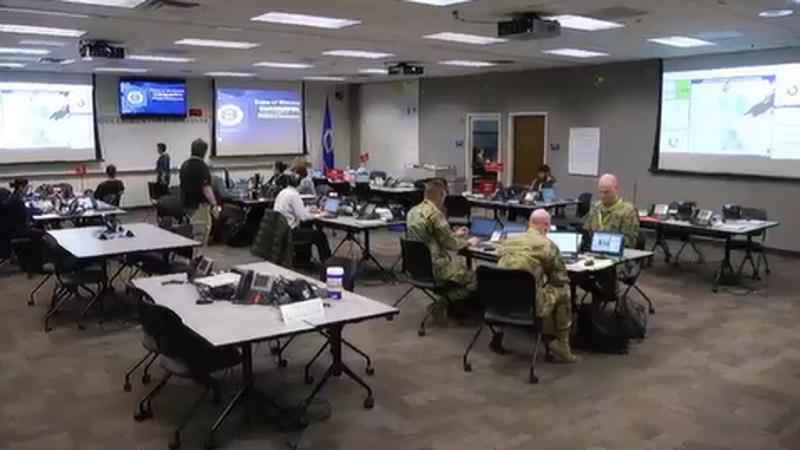US Researcher Exodus: International Efforts To Attract Top Talent

Table of Contents
Reasons for the US Researcher Exodus
The departure of top researchers from the US is a multifaceted problem with no single cause. Several key factors contribute to this troubling trend, impacting the nation's scientific leadership and future innovation.
Decreased Research Funding
Securing research funding is a constant struggle for scientists, and the situation in the US has worsened in recent years. This decreased research funding creates a cascade effect across the scientific community.
- Shrinking federal research budgets: Budget cuts in crucial areas like basic research, climate science, and public health have significantly reduced available funding.
- Increased competition for limited grant opportunities: The highly competitive grant application process has become even more challenging due to the dwindling pool of available funds. Researchers spend significant time and effort on writing grants, often with low success rates.
- Impact on research infrastructure and lab resources: Reduced funding directly affects the availability of essential equipment, lab space, and support staff, hindering research progress.
- Examples of specific funding cuts: For instance, cuts to the National Institutes of Health (NIH) have impacted biomedical research, while reductions in funding for NASA have affected space exploration and Earth science research. These are just two examples of specific fields being negatively impacted by the current climate.
Challenges with US Immigration Policies
The US immigration system presents significant hurdles for both domestic and international researchers. The complexities and uncertainties inherent in the system often deter researchers from pursuing opportunities in the US.
- Visa delays and denials for foreign researchers: The lengthy and often unpredictable processing times for visas, coupled with an increasing number of denials, create significant uncertainty and frustration.
- Difficulties in obtaining green cards for permanent residency: The green card process is notoriously lengthy and complex, discouraging talented researchers from committing to long-term careers in the US.
- Uncertainty around immigration policies impacting career planning: The frequent changes and uncertainties surrounding US immigration policies make it difficult for researchers to make long-term career plans.
- The impact on family members of researchers: The immigration process can be particularly challenging for researchers' families, creating additional stress and uncertainty.
Political and Social Climate
Beyond funding and immigration, the broader political and social climate in the US plays a role in the researcher exodus.
- Concerns around freedom of research and academic freedom: Perceptions of increasing political interference in scientific research and a decline in academic freedom discourage researchers from pursuing careers in the US.
- Perceived lack of support for scientific communities: A growing sense that the scientific community is not valued or supported by the government and society at large contributes to this trend.
- Impact of political polarization on scientific discourse: The highly polarized political climate has made it challenging to engage in productive scientific discussions, leading some researchers to seek more collaborative environments elsewhere.
- Examples of controversial policies impacting researchers: Controversial policies that limit or restrict research in certain areas can deter researchers from working in the US.
International Efforts to Attract US Researchers
Recognizing the opportunity presented by the US researcher exodus, many countries are actively recruiting top scientific talent. Their strategies often focus on creating a more welcoming and supportive environment for researchers.
Competitive Funding Opportunities
Several countries offer significantly more generous research funding compared to the US, attracting researchers seeking greater stability and resources.
- Examples of countries offering generous research grants: Countries like Canada, Germany, the UK, Australia, and several nations in Asia offer substantial research grants with longer funding periods.
- Highlighting long-term funding stability compared to the US: The promise of long-term, stable funding is a major draw for researchers weary of the constant grant-writing cycle in the US.
- Increased funding in specific research areas attracting US talent: Many countries are strategically investing in specific research areas to attract researchers with expertise in those fields.
- Details on application processes and benefits: Streamlined application processes and attractive benefits further enhance the appeal of these international opportunities.
Streamlined Immigration Processes
Many countries have implemented streamlined immigration processes to attract highly skilled individuals, making it easier for researchers to obtain visas and permanent residency.
- Fast-track visa programs for highly skilled researchers: Dedicated visa programs expedite the immigration process for researchers, reducing delays and uncertainty.
- Easier pathways to permanent residency and citizenship: Clearer pathways to permanent residency and citizenship provide researchers with greater stability and security.
- Examples of countries with welcoming immigration policies for scientists: Canada, Australia, and several European countries are known for their welcoming immigration policies for scientists and researchers.
- Support systems for researchers and their families: Many countries offer extensive support systems to help researchers and their families settle into their new environment.
Improved Work-Life Balance and Quality of Life
Beyond financial incentives and immigration policies, a better work-life balance and overall quality of life are major factors influencing researchers’ decisions.
- Comparison of work-life balance across countries: Many countries offer better work-life balance than the US, with more generous vacation time, parental leave, and flexible work arrangements.
- Highlighting better compensation packages and benefits in other countries: Competitive salaries and comprehensive benefits packages are significant attractions.
- Focus on factors such as affordable housing, healthcare, and education: Access to affordable housing, high-quality healthcare, and excellent educational opportunities for children are essential considerations for researchers.
- Addressing issues like affordable childcare and family support systems: The availability of affordable childcare and robust family support systems plays a significant role in researchers' decisions.
Conclusion
The US researcher exodus is a serious concern, representing a significant loss of talent and a potential blow to the nation's scientific leadership. Decreased research funding, challenging immigration policies, and a less supportive political and social climate are driving many researchers to seek opportunities abroad. Other countries are capitalizing on this situation by offering competitive funding, streamlined immigration, and an improved quality of life. Addressing the US researcher exodus demands a comprehensive strategy that prioritizes research funding, reforms immigration policies, and cultivates a supportive environment for scientific innovation. Failure to do so will only exacerbate this trend and undermine the nation’s long-term scientific competitiveness. Understanding the factors fueling this US researcher exodus is paramount to reversing this concerning trend and ensuring the future of American scientific progress.

Featured Posts
-
 The Ccp United Fronts Minnesota Operations Unveiling The Details
Apr 29, 2025
The Ccp United Fronts Minnesota Operations Unveiling The Details
Apr 29, 2025 -
 Hengrui Pharmas Hong Kong Share Sale Approved By Chinese Authorities
Apr 29, 2025
Hengrui Pharmas Hong Kong Share Sale Approved By Chinese Authorities
Apr 29, 2025 -
 Podsumowanie Testu Porsche Cayenne Gts Coupe Czy Spelnia Oczekiwania
Apr 29, 2025
Podsumowanie Testu Porsche Cayenne Gts Coupe Czy Spelnia Oczekiwania
Apr 29, 2025 -
 I Dont Know Why Ariana Grande And Jeff Goldblums New Musical Partnership
Apr 29, 2025
I Dont Know Why Ariana Grande And Jeff Goldblums New Musical Partnership
Apr 29, 2025 -
 Regionalliga Mitte Dsv Leoben Mit Neuem Trainerstab
Apr 29, 2025
Regionalliga Mitte Dsv Leoben Mit Neuem Trainerstab
Apr 29, 2025
